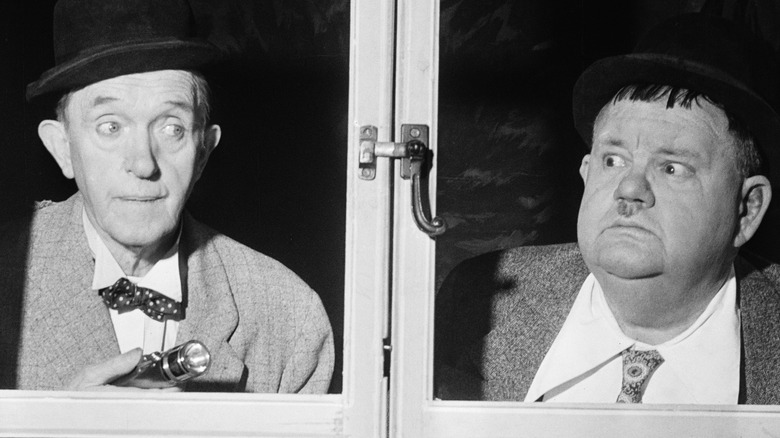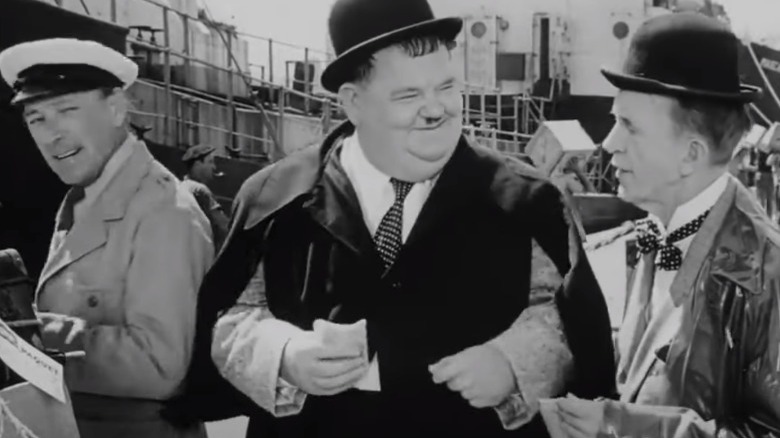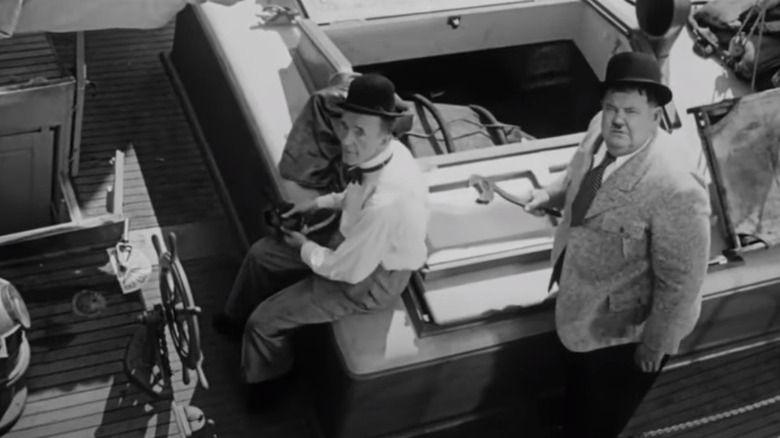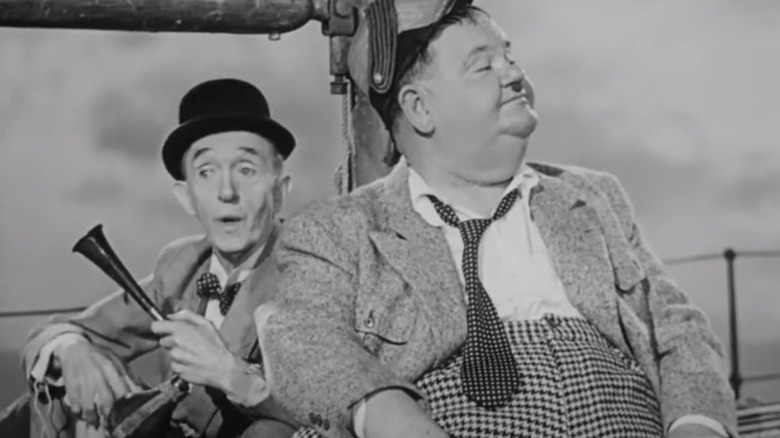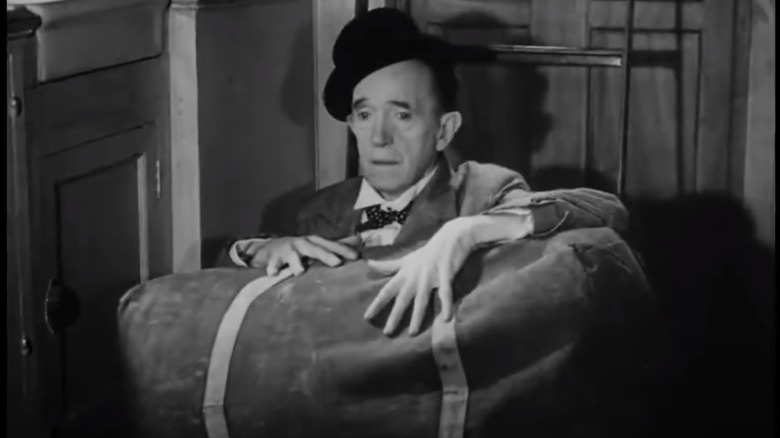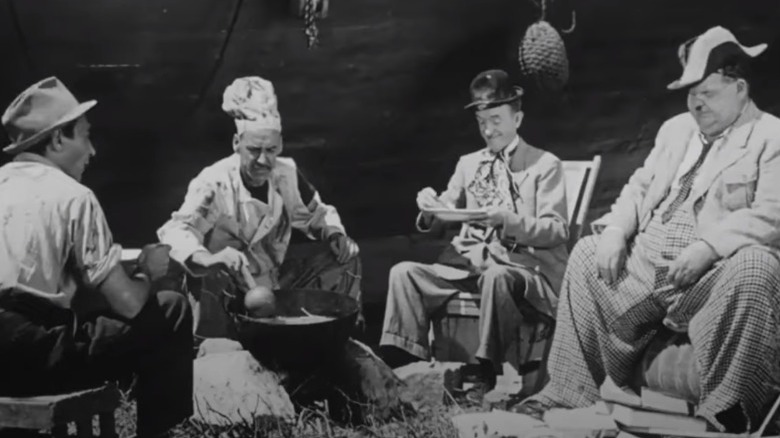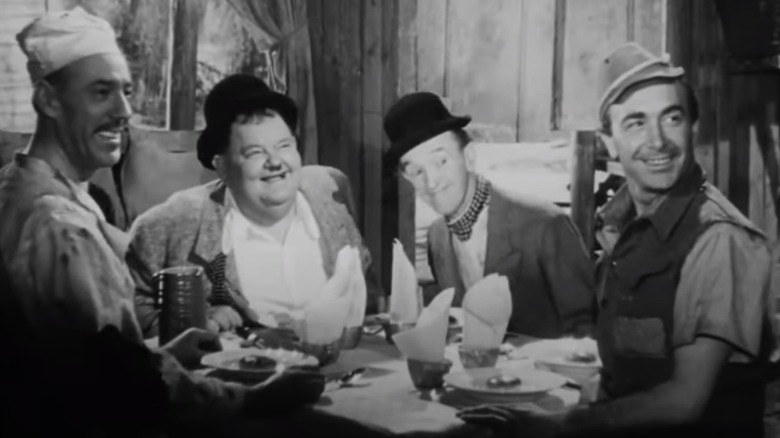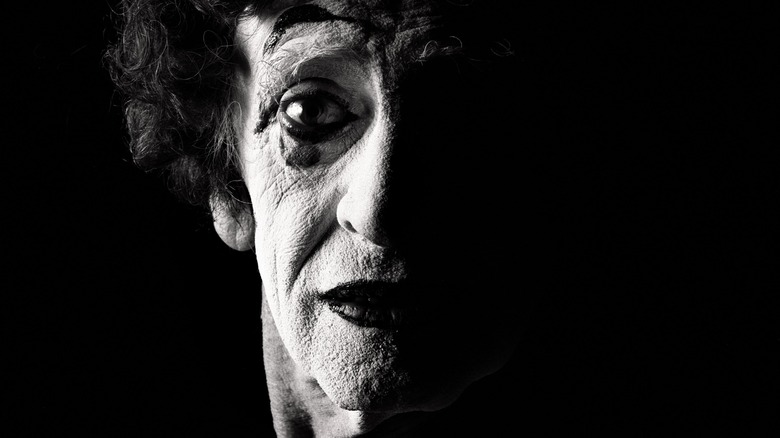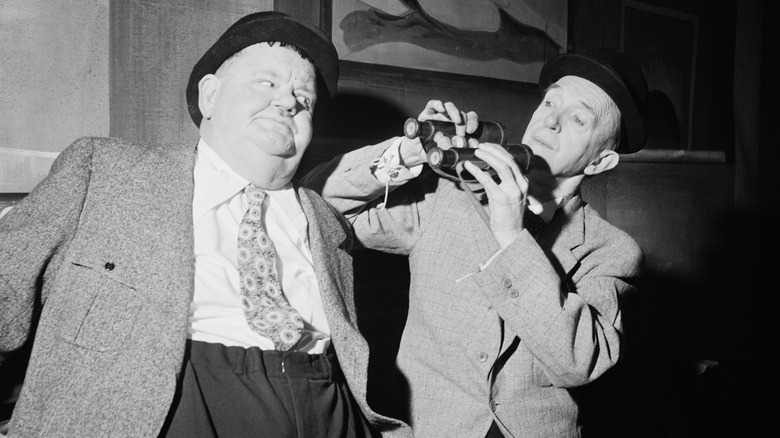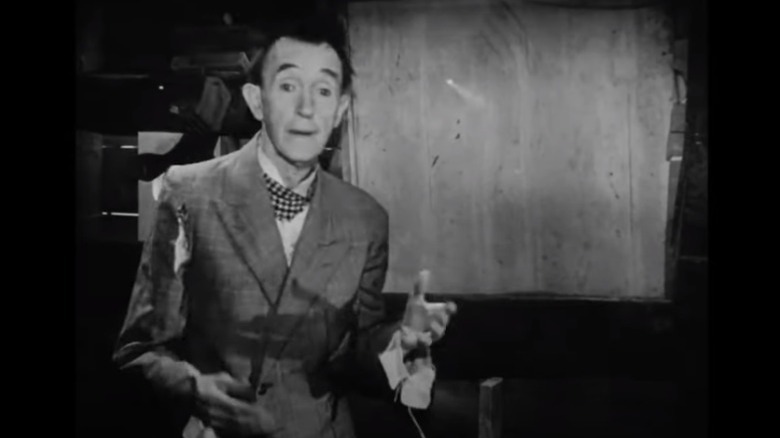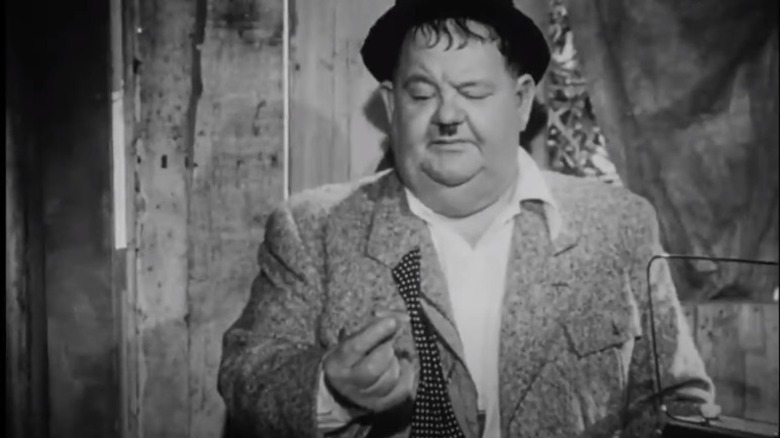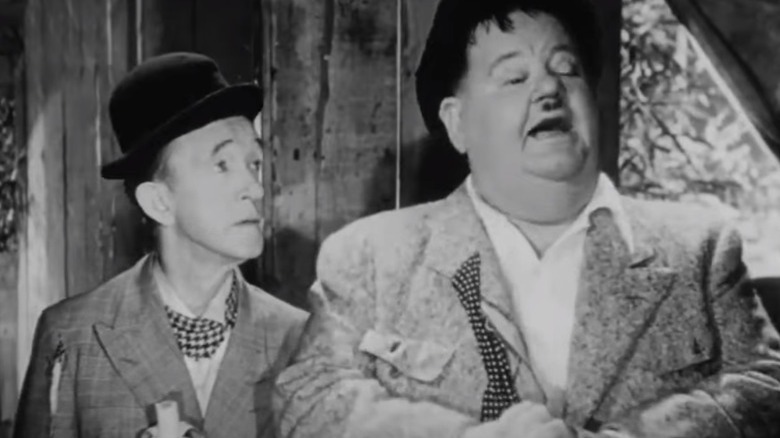What Laurel And Hardy's Last Movie Was Like Before They Died
Laurel and Hardy were an iconic comedy duo of opposites. They were officially a double act by 1927, and by the time they finished their last film together, they had starred in hundreds of productions.
Their last movie was an ill-received film that was released under several different names. It was "Robinson Crusoeland," "Atoll K," and "Utopia," and it was generally said to be a terrible end to a brilliant career. The story of the movie's filming is nothing short of epic, though, and it's the sort of thing that breaks even the best of friends. Laurel and Hardy? It didn't break them.
"Atoll K" was released in 1950, and Hardy died just seven years later. The Los Angeles Times reported that he had passed away after suffering a series of strokes that left him paralyzed, and Laurel initially declined to make a statement. Finally, his wife reported that he said, "What's there to say? He was like a brother. That's the end of the history of Laurel and Hardy." Laurel — who was ill at the time of Hardy's death — survived until 1965. His obituary reported that he had passed away after suffering a catastrophic heart attack, and at the time, he was under the care of the same medical professional who had sat alongside Hardy in his last months. He was quoted as saying, "It's been a great life, and I'm happy that I have made people forget some of their sorrows."
The film was a strange international project with bizarre consequences
After starring in some of their most famous films throughout the 1930s, Stan Laurel and Oliver Hardy found themselves at the mercy of studios during the 1940s, and then? World War II derailed pretty much everything. And that's actually important, because according to "Laurel and Hardy: The Magic Behind the Movies," their final movie came about because of a desire to kick-start the ailing, post-war, European entertainment industry with something that everyone was going to absolutely love.
Laurel and Hardy were approached by a team made up of representatives from the Italian, French, and British film industries, and they had a proposal that the duo couldn't refuse. Shoot a movie in 12 weeks, get paid, and create something new for a world that was struggling with the realizations that unfolded at the end of the war. It was 1950 when the deal for a new Laurel and Hardy movie was put on the table in front of them, and the offer came with a major draw: They were going to have the same amount of creative control they had in their heyday.
On the surface, it sounded great. There was, however, a major problem. The director was French, the writers were Austrian, French, and Italian, and when they sat down to collaborate, they realized that everyone spoke a different language.
When Laurel and Hardy arrived on set, there was no script
The film that would become Laurel and Hardy's last was ultimately written by Oliver Hardy and two American writers. Why? Because when the iconic duo arrived in Europe, ready to start shooting, there was still no script.
Bizarrely, the movie's producers had taken their international team of writers — who all spoke different languages — and decided that the best way to get them to sit down and hash out a script was to send them to put them up in several fancy Paris hotels. Frederick Kohner explained how well that worked out: "The four of us had a whole floor in [...] the most beautiful hotels in the world, and we were supposed to all work together there. But the others repaired at 5 o'clock to the casino, and stayed there until 1 o'clock in the morning, losing every penny they had."
So, not ideal. The team worked for months on the story, and Kohner says that there was absolutely no agreement on anything, up to and including what kind of movie it was going to be. Comedy, farce, and social commentary were all thrown into the mix by writers who didn't understand the languages that the others were speaking. Kohner said, "It got worse every week; it was terrible. Very soon in the game, frankly, I gave up. I decided there was absolutely nothing I could do but enjoy myself while I was in Paris."
The original version was... weird
"Atoll K" was ultimately the story of what happens when Stan Laurel and Oliver Hardy inherit an island that's later found to be rich in uranium. Hijinks ensue as the dynamic duo goes about establishing their own country. But the original story was, well, not that at all.
The original script saw Laurel getting picked up by a storm and deposited on an island which — for some reason — also contains crates of weapons, a grand piano, and Oliver Hardy. The uranium storyline is still there, but this time, the United Nations gets involved and tries to get them to choose a country. When they don't, they resort to all kinds of shenanigans to get the pair to leave the island and put the uranium up for grabs. The problem is solved at the end when the atoll sinks, and if it sounds not great, that's because it wasn't. Even more bizarre than the storyline itself is the fact that it took the writers a whopping three months to hash out the project as far as they did, at which point they just kind of collectively shrugged, told the production company that it was as good as it was going to get, and that's all there was to it. Simply put? They'd all had it.
They were sent on promotional tours before it was written
In the 21st century, promotional tours and marketing campaigns for movies are a huge deal. From "Deadpool" and "Cloverfield" to "Inception," it's all about getting audiences hyped. Today, most movie marketing is done with a viral, multimedia campaign ("The Dark Knight") or interviews with the stars, where someone hopes someone spills the beans (Tom Holland and Mark Ruffalo). There was a promotional tour for the final film of Stan Laurel and Oliver Hardy, too, but it was a little... optimistic: It happened before there was even a script.
Laurel was waiting to greet Hardy and his wife when they first made it to France, and no sooner had they gotten there than they were on the road again. From France, they headed to Italy, where they toured the country, viewed their own movies, and were expected to promote their new, post-war masterpiece... which the writers had completely failed to, well, even write. Even as they were met with all the gusto and celebration mustered by a post-war population eager for a reprieve, progress on the actual movie faltered.
When they returned, the writers sheepishly said that the script still needed a little help, and Laurel was initially fine with that. Everything's a work in progress, right? After reading what he was given — which was still three separate scripts — he reportedly responded, "Is this what you did all these months, boys? Did you really expect us to accept this rubbish?" Yikes.
No one knew what anyone else was saying
With a script hashed out and no one really happy but perhaps more appropriately just wanting to get on with things, filming started — and the language barrier somehow became even more of a problem. The final version of the film had Stan Laurel and Oliver Hardy speaking English, but the rest of the cast was dubbed. Not only was the dubbing extremely obvious, but it caused nothing but chaos on set.
The movie was filmed by actors speaking three different languages, and honestly, it seems like the behind-the-scenes filming should have been the actual movie. Some of the cast delivered their lines in their native Italian, some in their native French, and Laurel and Hardy not only spoke an English that their costars didn't understand, but they had to act like they knew exactly what was being said to them. The idea was that depending on where the movie was released, only certain parts needed to be dubbed. Odd? Absolutely.
The comedy of errors doesn't stop there, either. Leo Joannon was a French writer who became the director in a trial-by-fire kind of way when the previous director left, and his grasp of English was iffy at best. His assistant was an American, who spoke no Italian or French. In fact, the entire production had only a single woman who could communicate in English, French, and Italian... which seems like a massive oversight.
The work of one director was kept secret
The director of Laurel and Hardy's last movie was Leo Joannon... at least, officially. Unable to speak English, fond of wearing safari-style pith helmets, and concerned with choosing the proper megaphone for shouted instructions that half the cast and crew couldn't understand anyway, he was just one part of why the making of "Atoll K" was a bizarre story. Thankfully, another director stopped in at some point, and just what happened is unclear for a weird reason.
According to "The Final Film of Laurel and Hardy" (via Edge Media Network), director John Berry was living in France and stepped in to help salvage what he could. Actress Suzy Delair claimed that about half the movie was Berry's, that's pretty much all that's known. Why? Because at the time, Berry was living in exile, and having his name attached to a movie would have meant it didn't get a U.S. release.
Berry died in 1999, and according to his obituary in The New York Times, the actor-turned-director's problems started when he was called before the House Un-American Activities Committee as they hunted for insider information on rumored Communist activity in Hollywood. Refusing to throw anyone under the bus, he opted for a self-imposed exile in France. He said of the time: "[T]he horizon of my life became infinite; I met people, encountered a culture I'd never have known otherwise, one I got to know deeply because I had to survive in it."
They took some down time to kick-start a major career
There's no telling what a kind word from an established star can do for the career of an up-and-coming hopeful, and while filming "Atoll K," Stan Laurel reportedly took some time out of his busy schedule to give some serious weight to just one of those stars.
According to "The Life & Times of Laurel and Hardy," Laurel was in Paris when a young man invited him to see the show he and his company of entertainers put on. Laurel accepted the invitation and was so impressed that he went out of his way to mention the performer's name to some of the journalists who approached him. That man? Marcel Marceau.
Marceau, of course, went on to fame at a Laurel and Hardy level, and although mime is a performing art that's become something of an unfashionable caricature, it's worth noting that Laurel's promotion couldn't have been given to a better person. Marceau had been miming for a long time. He used his skills to help communicate with — and calm — the children he helped flee Nazi-occupied territories, and in a speech at the University of Michigan, he later said that he based the character of his sad clown on the sorrow that he felt at the loss of his father — and millions of others — in Nazi concentration camps.
Their appearance in France literally caused a mob scene
The offer to go to France for "Atoll K" came at a lull in Stan Laurel and Oliver Hardy's career: They'd passed their heyday, they'd gone on a hiatus from performing together, and even those who only have a passing familiarity with the way fame works knows that anyone who steps away from the limelight risks losing their place in it.
And that's one of the reasons France — and Europe — was so appealing. The duo was still wildly popular there, and with some of their films only released for the first time post-war, they were still super relevant. That came with a downside, though, and getting off-set and into the cities proved problematic.
At one point, Laurel decided that he wanted to go buy a suit, but knew that public appearances came with the kind of attention he just wasn't up for. Donning a hat and adding a pipe only got them so far, and after he was recognized, the inevitable mob not only happened but people got hurt. After Laurel took refuge in a hat shop, locked the door, and called the police, the pushing and shoving at the door got way out of hand. Injuries included a broken arm and a broken leg, and it took involvement from the French police to disperse the crowd and escort Laurel safely back to the set.
Stan Laurel was incredibly sick through months of filming
In addition to the odd, awkward dialogue and reactions, there's one major thing that anyone watching "Atoll K" is likely to agree on: The sickly appearance of Stan Laurel is so noticeable, it's distracting. And he really was so sick that a full team of medical personnel was kept on the movie set at all times, and even with constant attention, he lost 51 pounds over the course of the year-long filming.
He was in constant pain throughout the shoot, stemming from a series of illnesses that hit before he had fully recovered from the previous one. Work on the film started in the spring and by November, Laurel was in such crippling pain that he ended up being taken to a Paris hospital for surgery to correct a prostate problem. (Matters weren't helped by the fact that he needed a translator to communicate with hospital staff.) Feeling a commitment to return to the set as soon as he could, he did — which meant he was back on his feet when he should have been recovering.
It wasn't long after he got back on set that he got not just food poisoning, but dysentery. That's an intestinal infection caused by bacteria or parasites, and it results in severe cramps, fever vomiting, and bloody diarrhea. As filming dragged on, Laurel was only capable of remaining on his feet for about 30 minutes before he became too weak to continue.
Oliver Hardy had his health issues, too
Conditions on the set of "Atoll K" were nothing short of unbearable — and that was in part because of a massive heat wave that gripped Europe that summer. Oliver Hardy had been gaining weight in the years leading up to the production and as a complication, had begun suffering from cardiac fibrillation.
Also known as atrial fibrillation or a-fib, cardiac fibrillation is a condition that can cause very noticeable symptoms like chest pain, dizziness, and lightheadedness, along with more devious symptoms like weakness and fatigue. It can also impact a person's ability to do physical activities and can increase a person's likelihood of suffering something catastrophic, like a blood clot or stroke.
In the years after filming "Atoll K," Hardy's health continued a slow, downward spiral. The duo cancelled what would have been their final performance after Hardy came down with the flu and suffered a heart attack after a performance in Plymouth. That was in 1954 — the stroke that paralyzed him came shortly afterward, and he passed away in 1957.
Stan Laurel absolutely hated it, and it was a dismal failure
When biographer John McCabe wrote "Mr. Laurel and Mr. Hardy," he didn't spend too much time on "Atoll K." That's not entirely surprising, given what Stan Laurel had to say about it: "It was an abortion. ... Nobody — and that includes the director and us — knew what the hell was going on." His attitude toward that final film is unsurprising, too, given that it took him months to recover from the year-long fiasco and illnesses that had made a bad situation even worse.
And in the end, it was pretty much all for nothing. The 98-minute movie wasn't even released in the U.S. for several years, and ultimately was seen most popularly on the small screen — and, it was a heavily edited version that ran just 30 minutes long.
Reviews ran from brutal to heartbroken: The New York Times said, "The boys never should have left home," while other reviewers condemned the bad dubbing as being wholly distracting. The haggard, sickly appearances of both stars were enough to make audiences uncomfortable. Still, it was the Los Angeles Times that said perhaps the most observant farewell, writing, "It is all too plain that 'Utopia' is destined to be the last of the Laurel and Hardy comedies. For the many happy hours they have given us, our grateful thanks."
